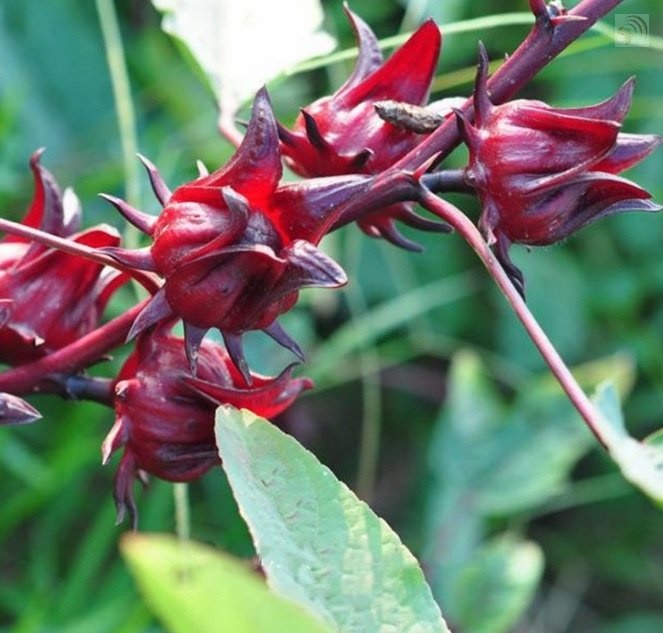BENEFITS OF HIBISCUS TEA
Hibiscus tea is a herbal tea that’s made by steeping parts of the hibiscus plant in boiling water. It has a tart flavor similar to that of cranberries and can be enjoyed both hot and cold. There are several hundred species of hibiscus varying by the location and climate they grow in, but hibiscus sabdariffa is most commonly used to make hibiscus tea.
Research has uncovered a range of health benefits linked to drinking hibiscus tea, showing that it may lower blood pressure, fight bacteria and even aid weight loss.
Hibiscus tea has been known to prevent hypertension, lower blood pressure, reduce blood sugar levels, keep your liver healthy, help with menstrual cramps, help with depression, aid digestion and help with weight management. It’s rich in Vitamin C, contains minerals such as flavonoids and has laxative properties.
This article reviews 8 benefits of drinking hibiscus tea.
1) Packed with Antioxidants
Antioxidants are molecules that help fight compounds called free radicals, which cause damage to your cells. Hibiscus tea is rich in powerful antioxidants and may therefore help prevent damage and disease caused by the buildup of free radicals
2) May help lower Blood Pressure
One of the most impressive and well known benefits of hibiscus tea is that it may lower blood pressure. Over time, high blood pressure can place extra strain on the heart and cause it to weaken. High blood pressure is also associated with an increased risk of heart disease. Several studies have found that hibiscus tea may lower both systolic and diastolic blood pressure. In one study, 65 people with high blood pressure were given hibiscus tea or a placebo. After six weeks, those who drank hibiscus tea had a significant decrease in systolic blood pressure, compared to the placebo. Similarly, a 2015 review of five studies found that hibiscus tea decreased both systolic and diastolic blood pressure by an average of 7.58 mmHg and 3.53 mmHg respectively. While hibiscus tea may be a safe and natural way to help lower blood pressure, it is not recommended for those taking hydrochlorothiazide, a type of diuretic used to treat high blood pressure, as it may interact with the drug.
3) May help lower Blood Fat Levels
In addition to lowering blood pressure, some studies have found that hibiscus tea may help lower blood fat levels, which are another risk factor for heart disease. In one study, 60 people with diabetes were given either hibiscus tea or black tea. After one month, those who drank hibiscus tea experienced “good” HDL cholesterol and decreased total cholesterol “bad” LDL cholesterol and triglycerides. Another study in those with metabolic syndrome showed that taking 100 mg of hibiscus extract daily was associated with decreased total cholesterol and increased “good” HDL cholesterol.
4) May boost Liver Health
From producing proteins to secreting bile to breaking down fat, your liver is essential to your overall health. Interestingly, studies have shown that hibiscus may promote liver health and help keep it working efficiently. One study with 19 overweight people found that taking hibiscus extract for 12 weeks improved liver steatosis. This condition is characterized by the accumulation of fat in the liver, which can lead to liver failure.
5) Could protect Weight Loss
Several studies suggest that hibiscus tea may be associated with weight loss and protect against obesity. One study gave 36 overweight participants either hibiscus extract or a placebo. After 12 weeks, hibiscus extract reduced body weight, body fat, body mass index and hip-to-waist ratio.
6) Contains Compounds that help Prevent Cancer
Hibiscus is high in polyphenois, which are compounds that have been shown to possess powerful anti-cancer properties. Test-tube studies have found impressive results regarding the potential effect of hibiscus extract on cancer cells. In one test-tube study, hibiscus extract impaired cell growth and reduced the invasiveness of mouth and plasma cell cancers. Another test-tube study reported that hibiscus leaf extract prevented human prostate cancer cells from spreading.
7) Could help Fight Bacteria
Bacteria are single-called microorganism that can cause a variety of infections, ranging from bronchitis to pneumonia to urinary tract infections. In addition to having antioxidant and anti-cancer properties, some test-tube studies have found that hibiscus could help fight bacterial infections. In fact, one test-tube study found that hibiscus extract inhibited the activity of E, coli, a strain of bacteria that can cause symptoms like cramping, gas and diarrhea.
8) Flavorful and Easy to Make
Make this with either fresh or dried flowers and choose to have it as a hot cup of tea or as hibiscus iced tea because either way it’s delicious and really good for you.
– 2 cups fresh hibiscus flowers or half cup dried hibiscus flowers
– 8 cups water
– quarter cup honey (add more if you like your tea sweeter)
– 3 tablespoons fresh lime or fruit juice
—If using fresh hibiscus flowers, remove the calyx or the green part of the base of the flower to which the stem is attached. You can also remove the pistil which is the thin thread like tube in the middle of the flower which has pollens attached to it or you can choose to keep it. You don’t need to do this if you are using dried flowers.
—Boil the tea-bring the hibiscus flowers and water to a boil in a large pot. Once the water starts boiling, switch off the flame and cover the vessel. At this point, you can also add other herbs such as lemon grass, lemon zest, etc. Let the tea steam for 15-20 minutes. Mix in the honey and lime juice till completely combined. Strain the tea.
—Serving Hibiscus tea-you can either serve hibiscus tea warm or you can chill it in the refrigerator for a couple hours/overnight. Either way it tastes delicious.
Enjoy!!!
Contributed by HE Prof Colin O Jarrett
Senior News Editor




